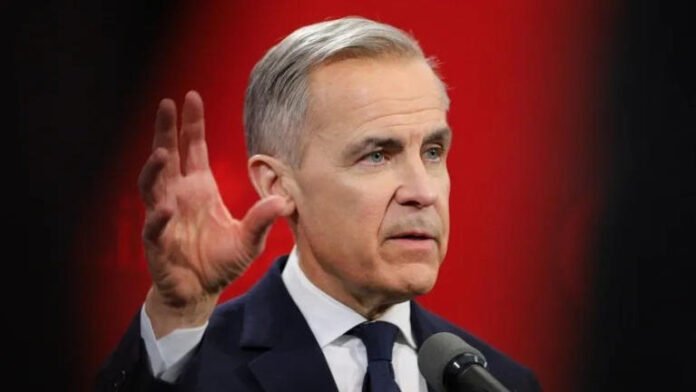Mark Carney, the former Governor of the Bank of England and a prominent Canadian economist, has once again made waves with a powerful statement about Canada’s sovereignty and its relationship with the United States. Speaking at a recent event, Carney not only celebrated his personal achievements but also launched a sharp critique of former U.S. President Donald Trump’s policies, particularly regarding American influence in international relations. The statement, bold and unequivocal, echoed across the political landscape, resonating with both Canadians and global observers.
In his speech, Carney emphasized that while Canada maintains a close relationship with its southern neighbor, it would never surrender its national identity or sovereignty. “Canada will never be America’s 51st state,” he declared, positioning himself as a strong advocate for Canadian autonomy amidst growing global political tensions. The declaration was more than just a response to past political narratives; it was a reinforcement of Canada’s independent path in the face of increasing pressures from the U.S., especially during Trump’s tenure.
A Champion of Canadian Identity
Mark Carney’s statement came at a time when many Canadians were feeling the weight of America’s political shift. Under Donald Trump’s administration, relations between Canada and the U.S. were often fraught with tension. From the renegotiation of trade agreements like NAFTA to Trump’s controversial policies on climate change and immigration, many Canadians were left questioning the stability of their nation’s relationship with its powerful neighbor.
Carney, who was born in Canada and served as the Governor of the Bank of Canada before his tenure at the Bank of England, has always been a strong proponent of Canadian values and policies. His words in the recent speech reflect his belief in the importance of Canadian sovereignty and his deep concern over the growing influence of American politics on global affairs.
“Canada is not just a geographical neighbor to the United States; it’s a distinct country with its own values, history, and political trajectory,” Carney said. “We will continue to forge our own path in the world, one that respects our differences and celebrates our independence.” Carney’s position not only highlights his national pride but also challenges the increasing narrative that Canada must align with every policy dictated by Washington, especially in an era of shifting political ideologies.
The Trump Factor: A Clash of Values
Mark Carney’s criticism of Donald Trump wasn’t just about political differences—it was a condemnation of what he perceives as an erosion of democratic values. During Trump’s time in office, many of the president’s policies were seen as divisive, often undermining the values that Canada holds dear, such as inclusivity, environmental responsibility, and multilateralism.
In his remarks, Carney pointed to the U.S. withdrawal from the Paris Climate Agreement, the America First policy, and Trump’s rhetoric on immigration and trade as examples of the growing ideological rift between Canada and the U.S. “We see the consequences of isolating nations and rejecting cooperation in today’s world. Canada will always stand for openness, respect for the environment, and collaboration with the international community,” Carney said. “We will never trade those values for the hollow promises of isolationism.”
Carney’s critique of Trump was not just a personal one; it reflected a broader sentiment among Canadians who felt increasingly disconnected from the values promoted by the U.S. under Trump. For many, the idea of Canada aligning more closely with America’s policies felt like a betrayal of the country’s principles of peace, fairness, and inclusion.
The Future of Canada-U.S. Relations
While Carney’s words might seem combative, they reflect a deep understanding of the delicate balance in Canada-U.S. relations. Historically, Canada and the U.S. have had a close and symbiotic relationship, with trade and security being central pillars of their partnership. However, Carney’s stance highlights the importance of maintaining that relationship without compromising Canada’s sovereignty.
“Canada’s prosperity depends on its relationship with the United States, but that doesn’t mean we should abandon our principles,” Carney said. “We have our own path to follow, one that includes embracing globalization, addressing climate change, and protecting the rights and freedoms of all our citizens.” His comments come at a time when Canada is attempting to recalibrate its role in the global order, balancing its historical ties with the U.S. with its commitments to multilateralism and international cooperation.
Carney’s remarks also suggest that Canada can—and should—maintain strong diplomatic and economic ties with the U.S. without feeling obligated to follow Washington’s lead on every issue. “Canada can be both a good neighbor and a sovereign nation,” he added, stressing that national identity doesn’t need to be sacrificed for the sake of proximity or convenience.
A Call to Action for Canadians
Mark Carney’s speech was a rallying cry for Canadians to take pride in their identity and their role on the global stage. With rising global challenges and increasing pressures from powerful neighbors, Carney’s message was clear: Canada must not lose sight of its independence and values. “We have always been a nation that charts its own course, and we must continue to do so,” he said, encouraging Canadians to remain steadfast in their commitment to their unique political and cultural identity.
As Carney’s words reverberate throughout Canada and beyond, they serve as a reminder of the importance of sovereignty in an increasingly interconnected world. While the relationship between Canada and the U.S. will always be significant, Carney’s statement underscores that Canada will never be just an extension of its southern neighbor—rather, it will continue to thrive as an independent and proud nation in its own right.

